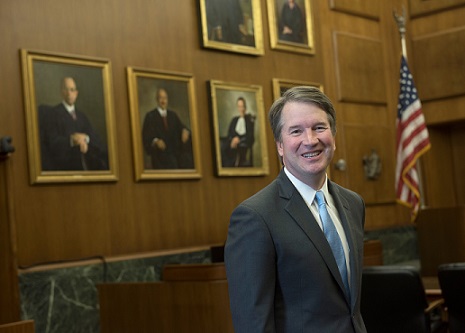Kavanaugh is said to be a front-runner to replace retiring Justice Anthony Kennedy

Judge Brett Kavanaugh. Photo by U.S. Court of Appeals for the District of Columbia Circuit.
Judge Brett Kavanaugh, a former law clerk for Justice Anthony M. Kennedy, is reportedly emerging as one of the front-runners to replace the retiring justice.
President Donald Trump said Wednesday that the process of choosing a replacement for Kennedy would “begin immediately,” and he plans to choose someone from his list of 25 potential nominees. Trump said Wednesday evening that he wants to pick someone who can remain on the court for 40 years.
Kavanaugh, 53, a judge on the U.S. Court of Appeals for the District of Columbia Circuit, was added to Trump’s list in November. He was appointed to the court by President George W. Bush.
Anonymous sources told Bloomberg News that Kavanaugh is a top contender, while an anonymous White House official told the Wall Street Journal that some insiders believe he should be a leading candidate. Legal experts also consider Kavanaugh a top contender, Reuters reports.
Other publications have listed five top contenders. The Washington Times cites a Fox News report listing the top five as Kavanaugh, Judge Amy Coney Barrett of the Chicago-based 7th U.S. Circuit Court of Appeals, Judge Thomas Hardiman of the Philadelphia-based 3rd U.S. Circuit Court of Appeals, and Judges Amul Thapar and Raymond Kethledge of the Cincinnnati-based 6th U.S. Circuit Court of Appeals.
Kavanaugh is a likely pick if Trump’s aim “is to move the court at least minimally right of its current position,” according to a December post at Empirical SCOTUSblog. The judge has an ability “to toe a moderate line while ruling predominately conservatively,” according to the blog.
Kavanaugh was an assistant and staff secretary to former President George W. Bush, and a former partner at Kirkland & Ellis. He worked for Bush during the 2000 presidential election recount, and also oversaw Bush’s search for potential judicial nominees, according to Reuters. He also helped draft the report recommending the impeachment of President Bill Clinton.
According to Empirical SCOTUS, his opinions tend to support big business and employers in employment disputes, and the prosecution in criminal cases. He dissented when his court rejected a challenge to an assault weapons ban, and dissented when his court required the U.S. government to allow an abortion for a 17-year-old immigrant who was being held in a shelter because she was in the country illegally. More recently, he wrote a majority panel opinion finding that massive power given to the director of the Consumer Financial Protection Bureau was unconstitutional. (The en banc appeals court reached a contrary decision.)
Kavanaugh was in the top six in a ranking of potential justices who were most “Scalia-like.” The list considered variables such as the percentage of opinions that promote originalism, how often Scalia was cited, and how often separate opinions were written.
Here is a look at the other reported leading contenders:
• Judge Amy Coney Barrett, 46, of the Chicago-based 7th U.S. Circuit Court of Appeals. Barrett was confirmed to the 7th Circuit on Oct. 31. She is a former Notre Dame law professor who had clerked for Justice Antonin Scalia. During her confirmation hearings, she came under fire for an article calling Roe v. Wade an “erroneous decision.”
• Judge Thomas Hardiman, 52, of the Philadelphia-based 3rd U.S. Circuit Court of Appeals. Hardiman was the first person in his family to attend college, and he helped pay for his Georgetown University law degree by driving a taxi. In free speech cases, Hardiman sided with an anti-abortion protester, but didn’t support students barred from wearing breast-cancer awareness bracelets with the message “I [heart] boobies.” In religion cases, he sided with a mother and her son who weren’t allowed to read from the Bible during a kindergarten show-and-tell, but generally sided with prison officials in religious rights cases filed by inmates. He also wrote a decision that allowed a gender-stereotyping claim by a gay man. Hardiman was in the top six on the list of most Scalia-like judges.
• Judge Amul Thapar. 49, of the Cincinnnati-based 6th U.S. Circuit Court of Appeals. Thapar, a South Asian American, was a federal judge in Kentucky before Trump nominated him to the 6th Circuit. Liberal groups have criticized Thapar’s approach in opinions involving political contributions and sexual harassment, according to the Wall Street Journal. Thapar got attention for a colorfully written opinion that referenced Pappy’s bourbon, Vulcans, Casablanca and Moses. The opinion tossed the convictions of nightclub operators accused of using enticing “bar girls” to lure drunken customers to pay tens of thousands of dollars for overpriced drinks. He is also known for sentencing an 84-year-old protesting nun to three years in prison for breaking into a Tennessee military facility used to store uranimium, according to Reuters. Thapar landed near the bottom of the list of judges who were most “Scalia-like.”
• Raymond Kethledge, 51, of the Cincinnnati-based 6th U.S. Circuit Court of Appeals. Kethledge is a former Kennedy clerk and a former in-house lawyer at Ford Motor Co. In one decision on behalf of a tea party group, he won conservative plaudits for refusing to interfere with a federal judge’s order that the IRS disclose lists of groups allegedly targeted because of their political beliefs. Another decision was described by the Wall Street Journal as a “hilariously caustic rebuke of the Equal Employment Opportunity Commission.” Kethledge was ranked near the bottom on the list of most Scalia-like judges.
Senate Majority Leader Mitch McConnell promised a vote on Kennedy’s replacement this fall. The Senate currently has 51 Republicans.



